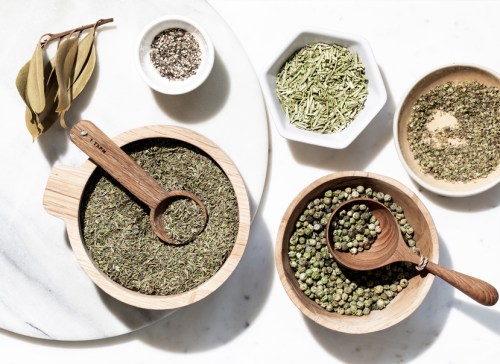Do Dried Herbs Have Different Health Benefits Than Fresh Ones?
An RD shares whether or not dried herbs have different health benefits than fresh herbs, and how to get the most bang for your basil "buck."

Cooking with herbs is not just a quick and easy way to infuse loads of flavor into a dish: Oregano, parsley, basil, mint, lemongrass, thyme, rosemary (you get the idea) also confer a plethora of nutritional benefits on their own. These benefits come from plant-based compounds known as polyphenols, which studies have associated with improved cardiovascular health and a lowered risk of a number of diseases, including cancer.
Experts in This Article
Mackenzie Burgess, RDN, is a recipe developer at Cheerful Choices
“Polyphenols provide numerous benefits to the body due to their strong antioxidant and anti-inflammatory effects, as well as their impact on the gut microbiome,” says Mackenzie Burgess, RDN, a registered dietitian, recipe developer, and founder at Cheerful Choices. “Polyphenols are metabolized by our gut microbiota which convert them into many beneficial substances.” In addition to polyphenols, many herbs also contain vitamins and small amounts of minerals like calcium, iron, copper, and zinc.
According to Burgess, polyphenols, vitamins, and minerals are present in both fresh and dry herbs—you know, the ones you can grab off shelves at the grocery store, toss mindlessly into your cart, and stash in your pantry for months (as opposed to fresh herbs, which go bad in the blink of an eye). “Both dried and fresh herbs provide a great source of nutrients and can be used to add flavor and variety to many dishes,” says Burgess.
Given how much more convenient it is to cook with dry herbs, we wondered how the nutritional value of fresh herbs compares to dry herbs. This question has intrigued scientists as well. And the answer, it seems, is: It depends.
“Certain herbs have been found to have a lower polyphenol content when dried compared to fresh, but in other herbs there was no change in polyphenol content between the two forms,” says Burgess, referencing a study that involved microwave-dried herbs.
A different study involving a variety of commonly-used herbs, including parsley, coriander, rosemary, dill, oregano and thyme, has shown that, in general, fresh herbs often have more polyphenols per gram than dried herbs. And another study suggests that drying diminishes the amount of vitamin C in oregano, lemon balm, and peppermint.
However, when it comes to day-to-day cooking, this is not something you should be overly concerned about, says Burgess, because in the grand scheme of things, the difference in the nutritional value of fresh vs. dry herbs is negligible. And, if you want to make sure you are getting the same amount of vitamins and polyphenols with dry herbs than with fresh herbs, she adds, all you have to do is use more dry herbs in your cooking to make up for the difference. “Gram for gram, fresh herbs may have more polyphenols, but if you use a higher weight of dried herbs the polyphenol content may be similar,” Burgess says.
Because the water content has been removed, dry herbs tend to have a more potent flavor than fresh herbs. Therefore, when it comes to substituting dry herbs for fresh ones in a recipe, a standard ratio is one tablespoon of fresh herbs to a teaspoon of dried herbs. However, you can confidently add a little more than a teaspoon of dried herbs per tablespoon of fresh herb without ruining your dish, Burgess explains.
“Depending on the herb, you could most likely get away with adding a slightly high amount of the dried herb to reap more nutrients without over-seasoning,” Burgess says, adding that the long game is what matters. “Ultimately, though, it’s all about a balanced diet over the course of weeks and months. If you regularly incorporate both fresh and dried herbs into a variety of colorful dishes, you’ll likely end up consuming an adequate amount of these beneficial nutrients.”
And while drying your own herbs is a good way to salvage fresh herbs that you know you won’t use up quickly enough, there’s certainly no shame in picking up a few jars next time you are at the grocery store. “If you have extra fresh herbs, drying them yourself can be a great way to reduce food waste,” says Burgess. “Otherwise, store-bought dried herbs are very convenient and are a great pantry staple.”
Sign Up for Our Daily Newsletter
Get all the latest in wellness, trends, food, fitness, beauty, and more delivered right to your inbox.
Got it, you've been added to our email list.










